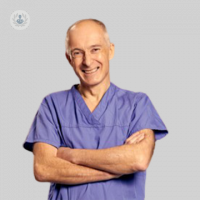How to diagnose and treat long-lasting throat problems
Written in association with:With colds, and at other times, such as after a night out, we all get altered feelings in our throats, such as a feeling of a lump, or odd pains, tightness or throat clearing, hoarseness or a dry cough. These throat problems pass quickly. However, sometimes the sensations can hang around for weeks, months or even years, causing anxiety that something serious might be going on, or just causing a real nuisance in life.

Rule out sinister underlying conditions
These throat problems are grouped by ENT specialists under the name “globus” (“globus pharyngeus” or “globus hystericus”), and our first goal is to rule out anything sinister, something quickly achieved from taking a history and looking at the throat with a small telescope passed into the nose under local anaesthesia. 99.9% of the time the cause is completely benign, but identifying what exactly it is and how to treat it takes a little longer.
Detailed inspection
It is important to take a detailed history and explore various possible avenues of thought, and also add into the diagnostic mix a slightly wider and longer telescope called a “transnasal oesophagoscope”. This makes it possible to check beyond the vision of a standard nasendoscope, down into the oesophagus (gullet) and check for signs of acid reflux, spasms, infections and inflammations, the whole procedure takes about seven minutes.
Tailored treatment
A tailored course of treatment can then be given, which may mean managing reflux, increasingly concentrating on diet and lifestyle rather than medicines, at least for “globus”. It may include speech and swallowing therapy from highly specialised colleagues, and treatment for muscle tightness or incoordination. Some patients with particularly ingrained symptoms of throat clearing and chronic cough may also benefit from a course of cognitive behaviour therapy (CBT). New diagnostic measures for persistent symptoms, especially working with specialist gastrointestinal and respiratory physiology units, and new drug-based approaches mean that these days, very few people have to continue to live with those niggling and worrying persistent throat problems.



